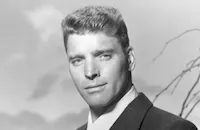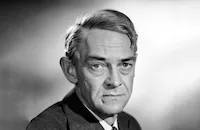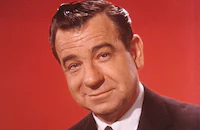The Kentuckian
Brief Synopsis
Cast & Crew
Burt Lancaster
Burt Lancaster
Dianne Foster
Diana Lynn
John Mcintire
Una Merkel
Film Details
Technical Specs

Synopsis
In 1820, widower Big Eli Wakefield is leaving Kentucky with his young son, Little Eli, and their dog, Faro, to escape from the feud between the Wakefields and the Fromeses. Little Eli's most prized possession is his father's hunting horn, which Eli promises he will be able to blow when he is "growed." One day, while on their way to Humility to catch the steamship to Texas, the pair stops in Prideville, where the constable sics his dog on Faro. When Eli prevents the constable from shooting the triumphant Faro, he is thrown in jail, and tavern worker Hannah Bolen tends to Little Eli. That night, Hannah explains to Little Eli that she is an indentured servant, or "bond girl," and listens wistfully as Little Eli relates his dreams of freedom in Texas. When Hannah overhears the constable trying to wheedle money from the Fromes brothers in exchange for allowing them to kill Eli, she steals the jail keys and, after freeing Eli, camps in the woods with the Wakefields. They are soon found, however, and Decker, to whom Hannah is bound, accuses Eli of stealing her. Outraged that the kindly Hannah is indentured, Eli uses the money he has saved to buy her freedom. Little Eli agrees with the decision, and soon the trio reaches Humility, where they are greeted by Eli's prosperous brother Zack and his wife Sophie, who hope to convince the rustic Eli to settle down. To prevent Eli from earning enough money for boat fare, Zack suggests that he fish for mussels, knowing that Eli will never make a profit. When Eli and Little Eli find a large freshwater pearl one day, Eli shows it to Zybee Fletcher, a garrulous medicine show man. Fletcher and tavern owner Stan Bodine, who despises Eli, convince him that the pearl is valuable and should be offered to President James Monroe. After the naïve Eli leaves, everyone roars with laughter, as freshwater pearls are worthless. That night, Eli and Little Eli begin a letter to the president, but are interrupted by the arrival of Susie Spann, the town's schoolteacher, to whom Eli is attracted. The next day, Eli mails the pearl to the president, and Bodine and Fletcher tell him about their hoax. Infuriated, Elis is about to beat Fletcher when Zack stops him, and later, Little Eli is teased by the other school children about his father's naïveté. While Zack tutors Eli about business matters, Eli thanks him for his help and wonders if he and his son will ever adapt to town life. At the schoolhouse, Little Eli is being bullied by Luke Lester when he hears the whistle of the Texas-bound steamboat and bolts from the room. The other children follow, as do most of the adults, and they are treated to a minstrel show and a speech by Pleasant Tuesday Babson, the leader of the Texas expedition. At dinner that night, Zack and Sophie reprimand Eli and his son for leaving work and school, and an embittered Little Eli shouts that he hates living in Humility. Realizing that he has been ignoring his son, Eli promises to take him hunting if he apologizes to Susie for disrupting class, and the next day, after Little Eli apologizes, Susie invites Eli to dinner. Eli accepts, but later forgets and instead takes Little Eli hunting. They are joined by Hannah, who tries to repay Eli the money he spent to free her. Eli realizes that Hannah obtained the money by selling herself into servitude to Bodine, and insists that she tear up her contract. Hannah pleads with him to remember his dreams of Texas, but when Eli suddenly recalls his date with Susie, he abruptly leaves. Eli arrives at Susie's house late, but she forgives him and accepts a kiss. Later, when the mail is delivered, the townsfolk are astonished to see that Eli has received a response from Washington, D.C. Eli intimates that the letter contains money then swaggers out, but when he and Little Eli open the missive, they find that it is a polite rejection from a secretary. Still desperate to show Bodine that he has succeeded, Eli, at Zack's behest, travels to a nearby bank to withdraw money for tobacco-buying season. Little Eli accompanies his father, and on the boat ride back, Eli outwits some gamblers and wins at roulette. Soon after, Eli, clothed in a suit instead of his customary buckskin, enters the tavern. Hannah is disheartened when Zack announces that Eli is going into business with him, and Bodine is angered when Eli boasts about receiving money from the president. Later, desiring revenge, Bodine encourages Luke to fight with Little Eli, and when Eli arrives to stop them, Bodine strikes him with his bullwhip. Unable to get close enough to disarm Bodine, Eli receives many vicious cuts, until Hannah rolls a wheel wagon onto the whip, and Eli is able to beat him fairly. That night, after Eli and Susie inform Little Eli that they are engaged and will be living in Humility, the heartbroken boy accuses his father of lying to him about Texas. Eli orders his son to bury their hunting horn, so that it will not remind them of their former life, but instead Little Eli manages to blow the horn and runs away. Crying, Susie confesses to Eli that she will never be able to be the kind of adventure-seeking wife that he needs. While searching for Hannah, Little Eli goes to Bodine's still house, where he finds Bodine with the Fromes brothers. The Fromeses hold Hannah and Little Eli hostage, and the next day, Eli, accompanied by Babson, goes to the still after unsuccessfully searching the town for them. As they walk, Babson offers to make Eli his lieutenant in the Texas expedition, and urges him to follow his heart. When Eli approaches the cabin, the Fromeses order Bodine to shoot Babson, and when he refuses, they kill him. One of the brothers then kills Babson, but the other is shot dead by Hannah, who has grabbed Bodine's gun. While the remaining brother reloads his rifle, Eli charges him, reaching him before he re-arms. After a fierce struggle, Eli kills the man, and a relieved Little Eli throws himself into his father's arms. Hannah starts to walk away, but Eli urges her to come to Texas with them, telling her that from now on, they are going to "live it bold."

Director

Burt Lancaster
Cast

Burt Lancaster

Dianne Foster

Diana Lynn

John Mcintire

Una Merkel

John Carradine

John Litel

Rhys Williams

Walter Matthau
Donald Macdonald

Edward Norris
Lee Erickson

Clem Bevans

Lisa Ferraday

Douglas Spencer
Paul Wexler

Will Wright
Mitchell Kowal
Norman Leavitt

Glenn Strange
James Seay

James Griffith
Faro, A Dog
Blackie, A Dog
Crew
Robert Carlisle
Thom Conroy
Maurice Depackh
Wayne Fury
Wayne Fury
Irving Gordon
A. B. Guthrie Jr.
Gil Harmon
Edward S. Haworth
Harold Hecht
Bernard Herrmann
James Hill
John Kean
Esther Krebbs
Ernest Laszlo
George E. Luckenbacher
Otto Ludwig
Richard Maybery
William B. Murphy
Norma
John Orlando
Betty Pagel
Robert Priestley
Archie Savage
Robert Schiffer
Paul Schmutz Sr.
Russell Shearman
Nate Slott
Lavaughn Speer
The Los Angeles Philharmonic Orchestra
James Vaughn
Carl Walker
Arthur Wilde
Whip Wilson
Whip Wilson

Film Details
Technical Specs

Articles
The Kentuckian
Based on the novel The Gabriel Horn by Felix Holt, the story was set in Kentucky circa 1820, when that state was on the edge of the frontier. It centered on a backwoodsman eager to pursue a future in Texas with his young son, partly because he is weary of an ongoing local family feud. Briefly tempted by his brother to stay in Kentucky and settle down, he in the end renews his determination to head for Texas with his son, only now they are joined by a woman. Lancaster's character is a Davey Crockett type, good-natured and slow to react in anger or negative emotion. In all, the picture is an amiable, folksy slice of Americana.
This was the first film Lancaster's independent production company made under its new agreement with United Artists, a deal which called for the production of seven films over two years at a total cost of $12 million. Initially, Lancaster saw the project as a musical, in the vein of Oklahoma!, but in the end he decided to hire Western novelist A.B. Guthrie, Jr., to adapt it as a straight dramatic piece.
Lancaster was quite vocal publicly about his belief that he knew perfectly well what he was doing as a director. "As an actor I've come to discover that lively discussions initiated by directors are not only stimulating but very valuable for character delineation," he wrote. To that end, he spent three weeks rehearsing before leaving Hollywood for the Kentucky location, mostly simply talking to his costars. But he created something of a splash when he was quoted in the Los Angeles Times as saying, "Directors are the most irresponsible people I've seen. They think they're supermen. Just try to show most of these directors where they may be wrong! They're afraid of being exposed." Then he applied for membership in the Directors Guild of America and was rejected because of his arrogance and "contempt" for the directing profession. The Guild instead gave him a waiver in order to direct The Kentuckian and invited him to reapply when the film wrapped - with the hope that his opinion of the profession would be higher. But by the time they offered the waiver, Lancaster was already filming.
Once into the shoot, Lancaster indeed started to find directing far more challenging and lonely than he had anticipated. Humbled by the experience, he admitted that he had been wrong: "I had the problem of getting up terribly early in the morning to go out to the locations to set everything up. I got home late at night. I had to work with all the rushes and work with the editor, and then sit up until midnight or sometimes one in the morning, going over the scenes for the next day. I had no time for anything. It's no life really. Nobody works harder than a director, if he's at all serious. His work is simply never finished." He also said, "I had no one to help me, I just struggled through on my own."
That's not entirely true, as Lancaster asked his friend James Hill, who had produced Vera Cruz the previous year, to help him out as his "third eye" when the cameras were rolling. But as Hill also had no directing experience, perhaps that arrangement was not the best. Regardless, all the hard work and long hours that Lancaster put into this project did not pay off with the critics. Their mostly lukewarm response hit Lancaster hard, and he abandoned his dream of a directing career.
Walter Matthau made his screen debut here as a whip-wielding villain, though even he later admitted that it was "a ridiculous part... I did it because I was desperately short of money."
Producers: Harold Hecht, James Hill
Director: Burt Lancaster
Screenplay: A. B. Guthrie, Jr., based on the novel The Gabriel Horn by Felix Holt
Cinematography: Ernest Laszlo
Music: Bernard Herrmann
Production Design: Ted Haworth
Costume Design: Norma Koch
Film Editing: George E. Luckenbacher, William B. Murphy
Whip Instructor: Whip Wilson
Cast: Burt Lancaster (Elias Wakefield), Dianne Foster (Hannah), John McIntire (Zack Wakefield), Diana Lynn (Susie), Una Merkel (Sophie Wakefield), John Carradine (Fletcher), John Litel (Pleasant Tuesday Babson), Walter Matthau (Stan Bodine), Donald MacDonald (Little Eli Wakefield).
C-104m. Letterboxed.
by Jeremy Arnold

The Kentuckian
Quotes
Trivia
Notes
The working title of this film was The Gabriel Horn. In August 1954, Los Angeles Times reported that permission to use the title The Kentuckian was granted to the filmmakers by the governor of Kentucky. The title cards of the picture read: "United Artists presents Photographed in CinemaScope Burt Lancaster as The Kentuckian." As noted by publicity information contained in the film's file at the AMPAS Library, the picture was produced by "the Hecht-Lancaster Organization, under its banner, James Productions." The Kentuckian was James Productions' first and only film.
In April 1954, a Los Angeles Times news item noted that Lancaster was hoping to cast Brandon de Wilde as "Little Eli Wakefield" and Jane Wyman as "Susie Spann." According to July 1954 Hollywood Reporter news items, Constance Smith was tested for a co-starring role, and Lancaster and producer Harold Hecht considered casting Kim Novak. Dianne Foster was borrowed from Columbia for the production. According to a October 27, 1954 ^HR news item, Ian Keith had been cast in the picture, but left the production because of an ulcer. Hollywood Reporter news items include Burt Mustin in the cast, but his appearance in the released film has not been confirmed.
Although an April 1954 Hollywood Reporter news item stated that the picture would be shot on location in North Carolina, the majority of the film was shot in Kentucky and Indiana. Studio publicity lists the Kentucky location sites as the Cumberland Falls area, the Levi Jackson Wilderness State Park near London, Owensboro and Green River, and the Indiana site as the Abraham Lincoln Memorial Village near Rockport. A August 30, 1954 Hollywood Reporter news item announced that the song "They Say, They Say," written by Dave Denner and Bill Neavin, had been purchased for the picture, but it was not heard in the viewed print. According to an October 1954 Hollywood Reporter news item, Roy Webb was originally signed as the film's music director.
According to a November 1954 Hollywood Reporter news item, 100 percent of the financing for the production was supplied by United Artists. The Kentuckian marked the screen acting debut of Walter Matthau and the directorial debut of Lancaster. According to a October 2, 1954 New York Times article, Lancaster applied for membership in the Screen Directors Guild in August 1954 but was rejected "because he allegedly had expressed opinions about directors regarded as uncomplimentary by the organization." The guild granted Lancaster a waiver to allow him to direct the film and invited him to reapply after it was completed. The only other picture ever directed by Lancaster was the 1974 production The Midnight Man, which he co-directed with Roland Kibbee.
In order to publicize The Kentuckian, noted American artist Thomas Hart Benton painted a seven-foot portrait of Lancaster, Donald MacDonald and "Faro," which Lancaster donated to the Los Angeles County Museum of Art in 1978. The Los Angeles premiere of The Kentuckian was a benefit for the Multiple Sclerosis Society, and the picture was entered in the 1955 Venice Film Festival.

Miscellaneous Notes
Released in United States Summer August 1955
Burt Lancaster's only foray into directing.
CinemaScope
Released in United States Summer August 1955













